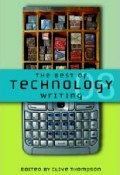Spliced feed for The Science Network |
| Morning Banana Diet [SciScoop Science Blog] Posted: |
| PAST BLAST: Genetic Basis For Lipstick and Pornography [SciScoop Science Blog] Posted: Many creatures including our fellow primates the New World Monkeys rely on highly specific scent molecules called pheromones, detectable by special nerves in the nose called the Vomeronasal Organ or VNO, to find a suitable mate. Even our humble mammal cousin, the mouse, was found to have 140 genes just for pheromone receptors when its genome was completely sequenced earlier this year. But humans are clueless when it comes to pheromone signals, according to University of Michigan evolutionary biologist Jianzhi "George" Zhang. He believes color vision put our pheromones out of business. "We think there might be some advantage to using a vision based signalling system, compared with a pheromonal one, because you can see color from a distance," says Zhang. |
| Melamine Apology [Sciencebase Science Blog] Posted: 18 Oct 2008 03:12 AM CDT
“We feel that though the incident occurred in enterprises, the government is also responsible,” Wen said in a rare interview with Bruce Alberts, editor-in-chief of Science magazine. The rare one on one interview took place on September 30 and was published in the US journal yesterday. Wen, apparently expressed sorrow and promised new food regulations after the melamine-tainted milk debacle. Previously, the head of China’s food quality watchdog, Li Changjiang, resigned “with state approval” back in September, at the height of the scandal, according to the Xinhua news agency. And, yesterday, New Zealand’s Stuff suggested that organised criminal gangs may have been behind the tainted milk that brought down the Chinese operations of the country’s food giant Fonterra.
You can forward this article to friends using the Share button to the right or add it to your online bookmarks at Delicious, Digg, Facebook etc. Grab the Sciencebase feed to be updated via newsfeed or email. |
| Science Books [Sciencebase Science Blog] Posted: 17 Oct 2008 07:00 AM CDT
First up is Go Green - How to Build an Earth-Friendly Community, which you will be pleased to learn has been published on apparently sustainable paper. The author, Nancy Taylor, is an environmental columnist and teaches a course on the art of green living. Her book does what it says on the tin (also recyclable, other metals are available), offering advice for those who want to change the way they live to be more in line with a sustainable future. Homeowners, students, professionals could do well to take a look and learn how to live greener lives. Politicians should also take a look, as at the bottom line, Taylor could show them how to save money. And, speaking of green, fuel cells are apparently the future. Gavin Harper, in Fuel Cell Projects for the Evil Genius explains how they work and how you could make and test a simple fuel cell. Next up is Ad Lagendijk’s Survival Guide for Scientists. In a scientific world, steadily growing virtual, it’s reassuring to know that some of the old principles of good writing, preparing a research paper, putting up a poster presentation, corresponding with fellow scientists, and giving a talk, are still valid. It’s not all flickering comments on Twitter and Feedfriend after all. The Guide is aimed primarily at undergraduates, grad students, and postdocs in the natural sciences and offers a practical howto on the foundations of writing, presenting and researching science. A Short Guide to the Human Genome from Stewart Scherer attempts to answer some of the basic questions about genetics. How many genes are there in the human genome? Which genes are commonly associated with disease? What are the biggest genes? How close is the human genome to the mouse, yeast, bacteria? Stem Cells, Human Embryos and Ethics edited by Lars Ostnor attempts to define whether it is acceptable from an ethical, as opposed to scientific standpoint, to use stem cells harvested from human embryos for biomedical research or as treatments for sick patients. This advanced book provides a brief introduction to the emerging technologies and a basis for wider debate. From inner space to nearby outer space, Ralph Lorenz and Jacqueline Mitton take us on a tour of Saturn’s mysterious moon in Titan Unveiled. This is the first authoritative book to look at the data from the Cassini-Huygens probe sent to observe one of the largest moon’s in the solar system, Titan. Staying with astronomy, but taking a much broader cosmological view, Leonard Susskind tells us of his battle with Stephen Hawking to make the world safe for quantum mechanics in The Black Hole War. With nothing less than an understanding of the entire universe at stake it was essential that the argument over the true nature of black holes between Susskind, Hawking, and Gerard ‘t Hooft be won, one way or the other, so that we can know what happens ultimately to someone sucked into a black hole. Finally, just arrived is this year’s Best of Technology Writing, edited by Clive Thompson. If this is anything like the previous two editions then it is a feast of great technology writing from my peers across the pond. It carries a fascinating mix of topics from a molecular recipe for the perfect gin & tonic to an ancient Greek artifact that may have been the world’s first laptop computer. |
| Do elephants have good memories? [Earth & Sky Podcast] Posted: 17 Oct 2008 04:10 AM CDT A student from Spain wonders if it’s true that elephants have good memories. Elephant ecologist Stephen Blake answers the question, and talks about what makes elephants so special. This posting includes an audio/video/photo media file: Download Now |
| You are subscribed to email updates from The Science Network To stop receiving these emails, you may unsubscribe now. | Email Delivery powered by FeedBurner |
| Inbox too full? | |
| If you prefer to unsubscribe via postal mail, write to: The Science Network, c/o FeedBurner, 20 W Kinzie, 9th Floor, Chicago IL USA 60610 | |
 The day after yet more melamine in food warnings, this time in Bangladesh where
The day after yet more melamine in food warnings, this time in Bangladesh where  Once again, I have a stack of great books sitting on the Sciencebase desk ready for review.
Once again, I have a stack of great books sitting on the Sciencebase desk ready for review.
No comments:
Post a Comment